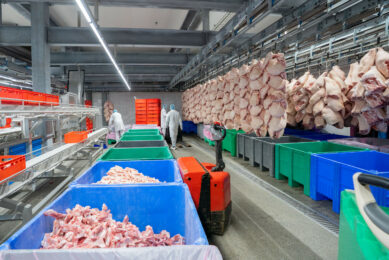The NA pork industry: Political football of the year

An arrest-detainment, shipment suspensions, forged documents and more round out this year’s China-related challenges – but exports from the USA to China are now strong and Canada is hopeful about exporting to China soon.
It’s been a year of serious disturbances for North American pork exports, as fallout continues from the trade wars between the USA and China, Canada and Mexico – and in Canada, from the arrest (and extradition to the USA) of an executive of China-based Huawei Technologies. However, exports from both countries to various markets remain strong.
The spread of African Swine Fever (ASF) is also a factor, having caused sharp production decreases in China and subsequently increasing China’s export demand for pork, the primary type of meat consumed in that country. Domestic pork prices are very high right now due to the tight supply situation.
USA and China: Trade war fallout
In the USA during much of 2019, exports of pork to China had been subject to tariffs of 62%, but on September 1st, China added an additional levy of 10% on US pork (beef as well). China had already imposed retaliatory tariffs on a wide range of US food products after US duties were imposed last year on US$ 300 billion worth of Chinese goods. Over that time, the Trump administration has provided over US$ 28 billion to compensate American farmers.
Export data for September are not yet available and it’s therefore hard to gauge the effect so far of the additional tariff. Joe Schuele, vice president of communications at the US Meat Export Federation (USMEF), noted that the amount of US pork being shipped to China going forward depends ‘greatly’ on whether US pork receives tariff relief. He does believe, however, that the USA will almost certainly supply more pork to China in the 4th quarter than a year ago.
Export to Canada of US pork/pork variety meat in August was similar to levels during 2015, 2016 and 2017, said Schuele, with 2018 being ‘a bit of a down year’.
And, whilst US exports of pork to Mexico have rebounded significantly since May (when Mexico removed 20% retaliatory duties on US pork, in place since June 2018), Schuele said “it will take some time for export volume and value to return to the record-large levels of 2017 and early 2018.” He added that “fully restoring pork demand in Mexico and US market share to pre-tariff levels is a top priority.”
Pork shipments from Canada to China
With China having placed retaliatory tariffs on many US food products starting in 2018, China looked in early 2019 to Canada, the world’s 3rd largest pork exporter. In March, various media outlets reported that pork shipments from Canada to China were up 80% over the year before. In April, May and June, pork exports from Canada to China continued to be as high as 150% of 2018 levels.
However, in late June, China suspended import of Canadian pork due to the purported use of a fraudulent export certificate, and after stating that some pork shipments from Canada to China had been found to contain ractopamine, a feed additive for which China tolerates no residues.
After investigation, the government of Canada declared that the shipments in question were not of Canadian origin. China has since declared that it has found dozens of forged shipping certificates.
Pork import ban an act of political retaliation
The Canadian pork industry has generally considered the import ban to be an act of political retaliation for the Huawei arrest, and in July, the Canadian government provided CAN$ 6 million (US$ 4.5 million) to expand and strengthen the Canadian pork market. A regional Canadian publication has just reported that the suspension of pork (and beef) exports to China has cost these industries CAN$ 100 million (US$ 75.6 million) so far.
However, Gary Stordy, director of government and corporate affairs at the Canadian Pork Council, explained that since the ban, Canada has been exporting pork to other major markets – namely the USA, Mexico and South Korea.
He added that “we are just back from meetings in China, where we were working to understand market conditions and how to regain access. Pork production has not slowed down and we hope to ship pork to China again in the near future.”













